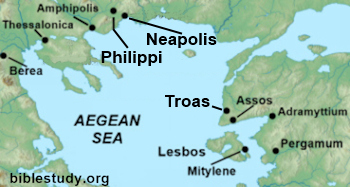A run of seven or eight hours, notwithstanding the easterly current, would bring the vessel under the lea of the island of Thasos, and within a few miles of the coast of Macedonia. The shore of the mainland in this part is low, but mountains rise to a considerable height behind. To the westward of the channel which separates it from Thasos, the coast recedes and forms a bay, within which, on a promontory with a port on each side, the ancient Neapolis was situated.
The Philippian Church
The Philippian congregation, which met here for worship on the Sabbath, consisted chiefly, if not entirely, of a few women (Acts 16:13). They were not all of Jewish birth, and not all residents at Philippi. Lydia, who is mentioned by name, was a proselyte (Acts 16:14). Thyatira, her native place, was a city of the province of Asia (See Revelation 1:11).
The business which brought Lydia to Philippi was connected with the dyeing trade, which had flourished from a very early period, as we learn from Homer, in the neighborhood of Thyatira. The trade is permanently commemorated in inscriptions which relate to the "guild of dyers" in that city, and incidentally give a singular confirmation of the veracity of Luke in his casual allusions.
In this unpretending place, and to this congregation of pious women, the Gospel was first preached by an Apostle within the limits of Europe.
Apostle Paul and his companions seem to have arrived in Philippi in the early part of the week, for "some days" elapsed before the sabbath. On that day the strangers went and joined the little company of worshippers at their prayer by the river-side. Assuming at once the attitude of teachers, they "sat down," (Acts 16:13. Compare Acts 13:14, and Luke 4:20) and spoke to the women who were assembled together.

The First Convert
The Lord, who had summoned His servants from Troas to preach the Gospel in Macedonia (Acts 16:10) now vouchsafed to them the signs of His presence, by giving Divine energy to the words which they spoke in His name. Lydia "was one of the listeners," and the Lord "opened her heart, that she took heed to the things that were spoken of Paul."
Lydia, being convinced that Jesus was the Messiah, and having made a profession of her faith, was forthwith baptized. The place of her baptism was doubtless the stream which flowed by the proseucha. The waters of Europe were "sanctified to the mystical washing-away of sin."
With the baptism of Lydia that of her "household" was associated. Whether we are to understand by this term her children, her slaves, or the work-people engaged in the manual employment connected with her trade, or all these collectively, cannot easily be decided. But we may observe that it is the first passage in the life of Apostle Paul where we have an example of that family religion to which he often alludes in his Epistles.
The "connections of Chloe," (1Corinthians 1:11) the "household of Stephanas," (1Corinthians 1:16, 16:15) the "Church in the house" of Aquila and Priscilla, (Romans 16:5. Compare Philemon 1:2) are parallel cases, to which we shall come in the course of the narrative. It may also be rightly added, that we have here the first example of that Christian hospitality which was so emphatically enjoined, (Hebrews 13:2. 1Timothy 5:10, &c) and so lovingly practised, in the Apostolic Church.
The frequent mention of the "hosts" who gave shelter to the Apostles, (Romans 16:23, &c) reminds us that they led a life of hardship and poverty, and were the followers of Him "for whom there was no room in the inn." The Lord had said to His Apostles, that, when they entered into a city, they were to seek out "those who were worthy," and with them to abide.
A Host at Philippi
The search at Philippi was not difficult. Lydia voluntarily presented herself to her spiritual benefactors, and said to them, earnestly and humbly, that, "since they had regarded her as a believer on the Lord," her house should be their home. She admitted of no refusal to her request, and "their peace was on that house." (Matthew 10:13).
Thus the Gospel had obtained a home in Europe. It is true that the family with whom the Apostles lodged was Asiatic rather than European.
The direct influence of Lydia may be supposed to have contributed more to the establishment of the church of Thyatira, addressed by John (Revelation 2), than to that of Philippi, which received the letter of Apostle Paul. But still the doctrine and practice of Christianity were established in Europe; and nothing could be more calm and tranquil than its first beginnings on the shore of that continent, which it has long overspread.
The scenes by the river-side, and in the house of Lydia, are beautiful prophecies of the holy influence which women, elevated by Christianity to their true position, and enabled by Divine grace to wear "the ornament of a meek and quiet spirit," have now for centuries exerted over domestic happiness and the growth of piety and peace.
Thus far all was peaceful and hopeful in the work of preaching the Gospel to Macedonia. The congregation met in the house or by the riverside, souls were converted and instructed, and a Church, consisting both of men and women, was gradually built up. This continued for "many days." It was difficult to foresee the storm which was to overcast so fair a prospect.
A bitter persecution was unexpectedly provoked in Philippi with the Apostles. It pitted the gospel against both heathen superstitions and the rough violence of the colonial authorities.
As if to show that the work of Divine grace is advanced by difficulties and discouragements, rather than by ease and prosperity, the Apostles, who had been supernaturally summoned to a new field of labor, and who were patiently cultivating it with good success, were suddenly called away from it, silenced, and imprisoned.